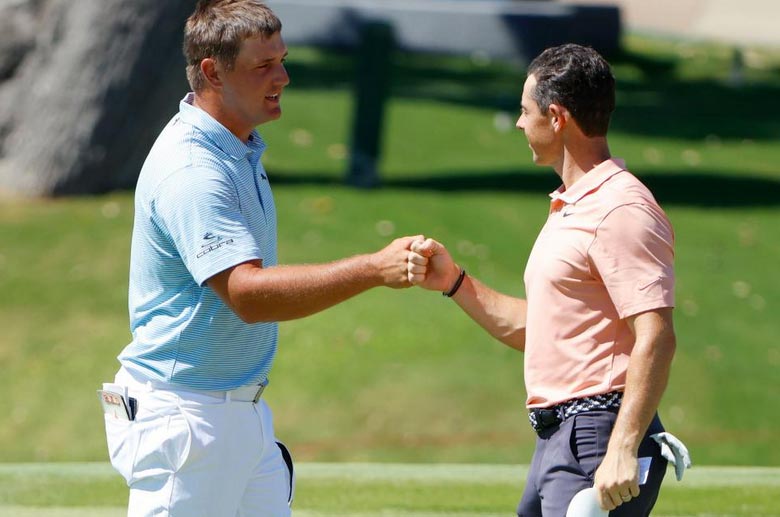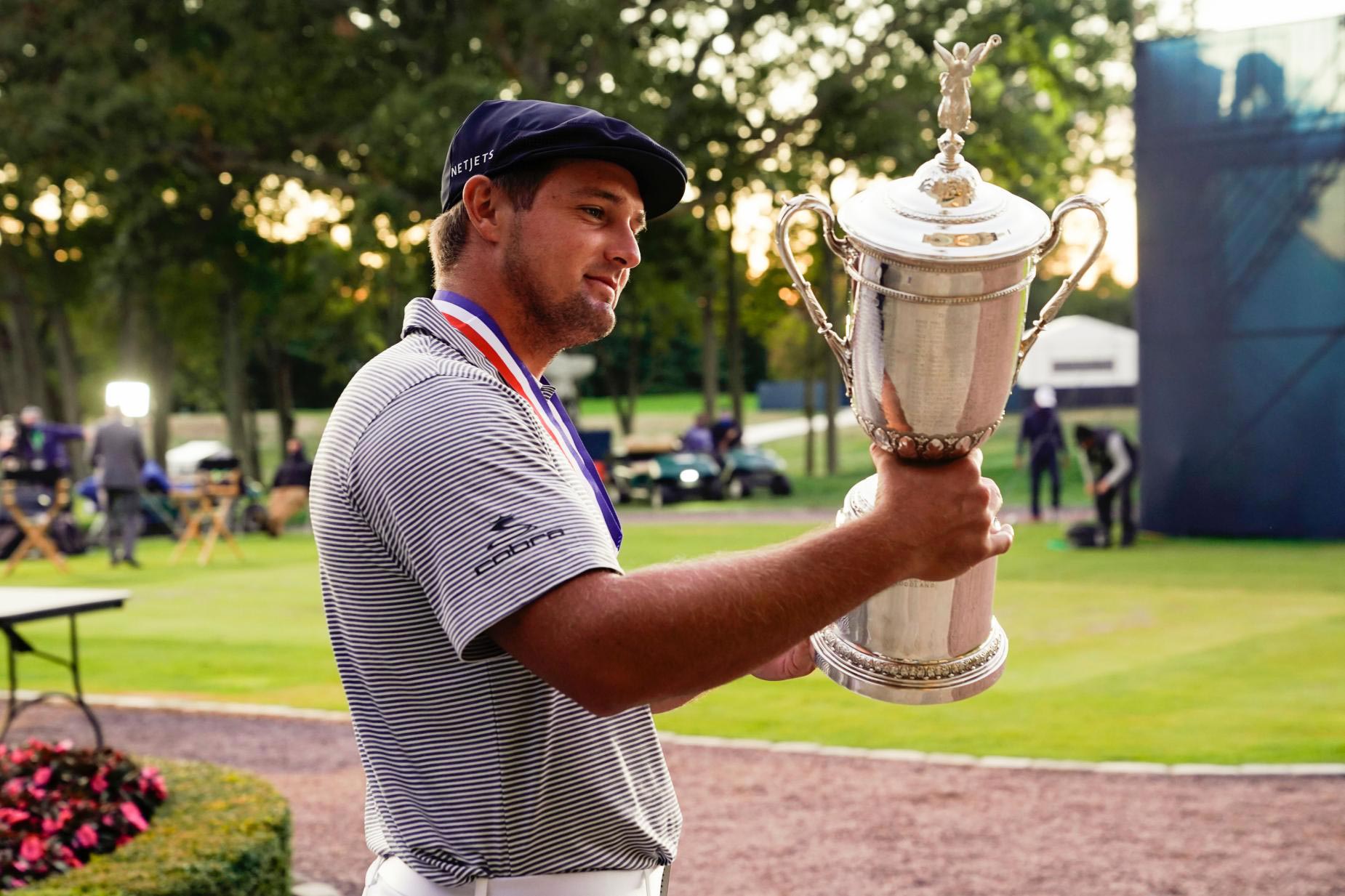“I played with him at Colonial the first week back out, but I sort of said, ‘OK, wait until he gets to a proper golf course, he’ll have to rein it back in.’ This is as proper as they come, and look what’s happened.”
—Rory McIlroy, on Bryson DeChambeau
“So many times I relied on science, and it worked every single time.”
—DeChambeau, after his US Open victory
For a moment, let’s forget the specifics. Let’s forget the weight and distance gain, the muscle activation fitness regimen, the protein shakes, the single iron length, the putting lasers, and a thousand other things that fall under the umbrella of “science”. Forget it all and think broadly. We need some distance to understand Bryson DeChambeau’s win at the US Open – the most consequential result for golf since Tiger Woods won the Masters in 1997 – and to internalise the only conclusion that really matters: on an intellectual level, nobody else is trying hard enough.
If that sounds like an insult to a group of professionals who have dedicated their lives to becoming elite practitioners of the sport, so be it. DeChambeau is putting them to shame simply because he has the courage not just to seek out innovative ideas, but to pursue them with monomaniacal energy. His commitment is so rigorous, so fanatical, that everyone else comes off looking like a dilettante.
This makes people uncomfortable, fans and players alike, but the ultimate legacy of his astonishing win at Winged Foot – a course that was supposed to be the antithesis to and kryptonite for the DeChambeau Style – is that we can no longer dismiss him as a pretentious pseudoscientist. That comfort is gone, and now we reckon with a reality that forces from the mouths of the doubters the three most painful words imaginable.
He was right.
• • •
Let’s talk about Tiger in ’97. With that win at Augusta, which so quickly validated and then exceeded every bit of hype, the game was fundamentally changed. The kids who watched him then, and who are dominating the PGA Tour today, understood golf entirely through the context of Tiger. His power, his fitness, his passion, his competitive edge. These were the templates they followed. Some, like Patrick Reed, even began to wear red on Sunday and to speak with the same clipped cadence. Even in less extreme cases, Tiger’s physical and psychological influence was felt. You see it everywhere today; the game exists in his image.
What will the DeChambeau Effect look like? In 15 years, will we watch a new generation of hulked-up bombers chain-guzzle protein shakes, pecs bursting out of their golf shirts, each iron as long as the next, as they analyse complex topographical charts and an assistant clocks the speed of their putts?
The answer is, probably yes. DeChambeau is so full of good ideas that some of them are going to trickle down, particularly if he keeps winning. Whatever Chris Como, his coach, is doing, other coaches will do. Muscle activation technique, which has been a staple in the NFL for years, will become widespread in golf. Barring any major rules change, power will reign even more completely than it did before, and player physiques will reflect it. All of DeChambeau’s good ideas will be copied.
That’s because DeChambeau is golf’s answer to Billy Beane. He takes baseball’s Moneyball approach to every facet of the game; he’s open to literally any idea that might make the sport easier and help him shoot a low score, and he’ll pursue the slight edges with monastic fervour. Playing within a game that hews closely to tradition, socially and competitively, DeChambeau has the self-confidence to ignore conventional wisdom. The difference is that Beane sought out market inefficiencies because his Oakland A’s operated from a major payroll deficit. DeChambeau, on the other hand, was already supremely talented. When an NCAA and US Amateur champ opens his mind to the cosmos in an effort to squeeze every possible advantage, Winged Foot is the result.
Writ large, that’s both the lesson and consequence of the past weekend, and the single element that young aspiring golfers should take to heart. To compete in the Bryson Era, it’s not enough to have talent and to work hard. You better think hard, too. You better be so committed that you treat golf like an experiment to be solved, and you better stumble upon your own innovations. DeChambeau’s long-lasting effect on this game won’t be physical. It will be mental.
• • •
Do you find DeChambeau invigorating, or infuriating? The answer probably says less about DeChambeau, and more about you, how you feel about change, about tradition, about innovation, and about the limitations of what golf should be.
Of all the players who commented on DeChambeau when it became clear that he would win the US Open, Rory McIlroy’s remarks were the most interesting.
“I don’t really know what to say because that’s just the complete opposite of what you think a US Open champion does,” McIlroy said. “Whether that’s good or bad for the game, I don’t know, but it’s just – it’s not the way I saw this golf course being played or this tournament being played. It’s kind of hard to really wrap my head around it… I think it’s brilliant, but I think he’s taken advantage of where the game is at the minute.”
Nobody explicitly asked him for an appraisal on whether it was “good or bad”, but in Rory’s defence, that part of the question is implied. Still, if you’re like me, you read a bit of negative judgment in the answer, and a bit of frustration. DeChambeau seems to have found a cheat code, and the idea that it’s working might seem unjust, especially to a player like McIlroy who has experienced a slew of difficulties at the Majors in the past half-decade.

It’s not even a new concept. Tiger’s fitness regimen changed the game in similar ways, but DeChambeau wanted to do more than simply follow in Tiger’s footsteps. He wanted to continue the evolution and blow it out to its most extreme form, and his self-belief is so total that he refuses to be held back by cautionary tales.
Example: the reason most people thought he’d fail at Winged Foot is because the thick rough punishes errant tee shots, and DeChambeau’s length comes at the expense of accuracy. If you can’t hit fairways, you can’t win – not there. It sounds logical, but look closer and it’s easy to see how conventional wisdom fails. What actually happened, and what DeChambeau noticed before the week began along with his coach Chris Como and Mark Broadie, is that the fairways were so narrow that they punished everyone, long hitter or short. Nobody hitting driver could reasonably be expected to hold a high percentage. So, in that case, why not be long?
“Everyone talked about hitting fairways out here,” Xander Schauffele said on Sunday, when asked about DeChambeau. “It’s not about hitting fairways. It’s about hitting on the correct side of the hole… you’d rather be the guy in the rough with a lob wedge than with an 8-iron or 7-iron.”
Precisely. Of course, wide fairways pose the same conundrum. Punish everyone, and length wins. Punish no one, and length wins. You see the common denominator: length wins.
Now, it’s not quite that simple. DeChambeau had a comprehensive game plan, played beautifully from the rough and was spectacular with the putter, particularly in the final round. But it starts with rejecting the original idea, that aggression won’t work. It starts by rejecting the warnings.

The nice thing about athletic innovation is that the results are measurable. DeChambeau’s physical transformation attracts the bulk of public attention, and puts the focus on his drives (which are spectacular). Did it work? Well, in the 2020 season, he finished first in strokes gained/off the tee on the PGA Tour. That’s compared to 24th, 12th, and 35th in prior years. It worked.
His putting game deserves its own feature-length article, but you can get a small taste from this quote: “If I hit a 40-footer and it says 10.1 miles per hour on the device, I know that I’ve executed it correctly. And if I see the ball go two feet past that 40-foot mark, I know it’s perfect.” So it involves radar and arm locks and lasers and men holding towels when necessary. Did it work? In 2020, he finished 10th in strokes gained/putting, compared to 28th, 32nd and a woeful 145th in prior years. It worked.
Today, his approach game is relatively poor (119th by the strokes gained metric last season), but you can bet he’ll find a way to improve that, too, and if his performance from the thick grass at Winged Foot is any indication, he’s on his way. “I don’t think they can set it up for him, to be honest,” Louis Oosthuizen said on Sunday, “he’s so strong out of the rough.” In fact, DeChambeau was first in the entire field at Winged Foot in strokes gained/approach, accumulating a massive 7.551 strokes in four rounds. It’s working.
You can view this success as a referendum on the specific techniques DeChambeau is using to improve his game. Yes, there will be copycats. He’ll be very influential in that regard, perhaps more than anyone since Tiger. But as DeChambeau himself readily concedes, “not everybody has to do it my way”. The fact that he’s thrived with muscle activation technique and lasers and protein shakes doesn’t mean that everyone will. It doesn’t even mean that he will, at least not forever.
The true revolution that DeChambeau has initiated is not a physical or technical one, brilliant as those elements might look today. No, he’s leading an intellectual transformation, and it’s defined by both the ability to consider golf in new and counterintuitive ways and the courage to pursue those ideas with a zealot’s obsession. In that sense, he has already lapped his contemporaries and put them on the defensive, and he’s done it on the basis of principles (“length wins!”) that seem shockingly obvious.
• • •
There’s a story, almost certainly apocryphal, about Christopher Columbus attending a dinner party at a nobleman’s castle after his voyages. At one point, a guest spoke up to say that discovering a new trade route to the Indies wasn’t such a great accomplishment; really, anyone could do it. Rather than respond, Columbus asked for an egg. When it arrived, he challenged everyone at the table to stand the egg straight on its end. They all tried, they all failed; the egg toppled every time. When they were done, Columbus took the egg, cracked the end, and stood it straight up with no problem. “And now that I’ve shown you how it’s done,” he said, “any fool could manage.”
Bryson DeChambeau has cracked the egg. What happens next is up to everyone else.

